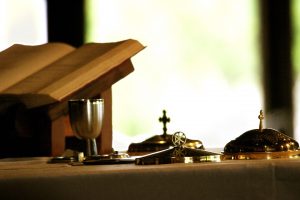Back to Catechism: Communion Q & A
This article reflects on the section of Luther’s Small Catechism “Christian Questions and Answers. Read the relevant portion online here.: http://catechism.cph.org/en/questions-answers.html
 Many, if not most, editions of the Small Catechism published in recent centuries conclude the enchiridion (handbook portion, as distinct from the expository portion with its questions and answers and with the Biblical support) with a set of questions and answers said to have been drawn up by Martin Luther to enable the pastor to question the Christian, or to enable the Christian to ask himself or herself, in preparation for receiving the Lord’s Supper. Though ascribed to Dr. Luther, these questions and answers did not appear in any edition of the catechism until 1551 (more than 20 years after the first edition was printed and five years after Luther’s death). While Luther may not have drawn up these questions and answers himself, they reflect the catechism’s teaching concerning our sinful state, Christ’s redemptive act performed “for me,” and the blessings God gives each of us with His body and blood in the Lord’s Supper.
Many, if not most, editions of the Small Catechism published in recent centuries conclude the enchiridion (handbook portion, as distinct from the expository portion with its questions and answers and with the Biblical support) with a set of questions and answers said to have been drawn up by Martin Luther to enable the pastor to question the Christian, or to enable the Christian to ask himself or herself, in preparation for receiving the Lord’s Supper. Though ascribed to Dr. Luther, these questions and answers did not appear in any edition of the catechism until 1551 (more than 20 years after the first edition was printed and five years after Luther’s death). While Luther may not have drawn up these questions and answers himself, they reflect the catechism’s teaching concerning our sinful state, Christ’s redemptive act performed “for me,” and the blessings God gives each of us with His body and blood in the Lord’s Supper.
The questions are meant to be asked after the Christian has confessed their sins and received absolution, and after careful and thorough instruction in the chief parts of the catechism. They begin by leading individuals in acknowledging that they are sinners, which they see by examining their lives in light of the Ten Commandments, that they deserve God’s wrath and eternal condemnation, and that their only hope for salvation is in the work of Christ. This Christ is the second person of the Trinity, God the Son, who alone is both true God and true man, as is confessed by the creeds. He is the one who died for me, shedding His blood for me on the cross. All of this is declared in the Gospel and belongs to the most basic teachings of the faith, reflecting the commandments and the Creed.
The next set of questions pertains to the Lord’s Supper, instituted by Christ, in which He gives us His true body and blood to eat and to drink. This body is the very body which hung on the cross and died for us, and this blood is the very blood which was shed for us. Only that truth, that reality, is consistent with the words which Christ spoke when he blessed and distributed the bread and wine to His disciples. It is Christ’s word and promise that makes present His body and blood. Our faith merely trusts that word as our mouths receive what Christ gives us.
The Sacrament, Christ’s visible word and promise, serves to remind us of what He has done for us, and in our eating and drinking we confess that word and promise to those around us who join us in our eating and drinking, to those in the Church throughout the world who eat and drink, and to the entire world until such time as Christ returns to bring this age to an end and brings to pass the new heavens and the new earth. As long as this age lasts, the Church, the body of Christ, will by this act be announcing to Church and world what Christ has done for all, and will be summoning others to faith in Christ.
Receiving this Sacrament is an act of penance, as we acknowledge our sins and come for forgiveness; an act of trust in Christ, who alone can be the source of the forgiveness we need; and a source of joy and comfort, knowing that what Christ has promised is truly “for me.” Since in the Sacrament we are promised such great blessings, and since we have such a great need for them, we should admonish and encourage our fellow Christians to avail themselves of this Sacrament as often as possible.
The final question is quite pertinent to those times when we might not be aware of our need for the Sacrament. The words of advice here are taken from Luther’s words in the Large Catechism: touch your body to see if you still have flesh and blood; look around you to see if you are still in the world; and know that you still have the devil lurking about you. Knowing these things will lead you to run to your pastor and beg for the sustenance that Christ has for you here.
With these questions and answers Christians are given the opportunity to examine themselves, to see their sinfulness, to see the need they have for Christ’s gifts, and to be assured that Christ has supplied these gifts to each and every one of them as individuals, uniting them into His body, the Church. We need these reminders, and we need and rejoice in the blessings given by Christ!
Rev. Dr. Edward G. Kettner is Professor Emeritus of Systematic Theology at Concordia Lutheran Seminary (Edmonton).





